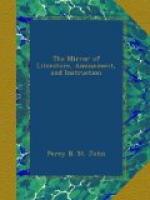THOS. HY. PRS.
* * * * *
THE BORROWING DAYS.
(For the Mirror.)
Proverbs relating to the weather are of uncertain origin. The Glossary explains the Borrowing Days the three last of March, and adds concerning the origin of this term, the following popular rhyme is often repeated:—
“March borrow it fra Averill
Three days and they were ill,
Also March said to Aprill
I see three hogs upon a hill,
But lend your three first days to me
And I’ll be bound to gar them die.
The first it sall be wind and weet,
The next it sall be snaw and sleet,
The third it sall be sic a freeze,
Sall gar the birds stick to the trees,
But when the Borrowed Days were
gone,
The three silly hogs came hedglin home.”
Complaint of Scotland.
The Country Almanack for 1676, says of April—
“No blushing blasts from March needs
April borrow,
His own oft proves enow to breed us sorrow,
Yet if he weyr with us to sympathize,
His trickling tears will make us wipe
our eyes.”
In the British Apollo, the meaning of the old poetical saying is asked—
“March borrows of April
Three days and they are ill,
April returns them back again
Three days, and they are rain.”
In Devonshire the three first days of March are called “blind days,” unlucky days, and upon them no farmer will sow his seed.
Dr. Jamison in his Dictionary of the Scottish Language, says “These days being generally stormy, our forefathers have endeavoured to account for this circumstance by pretending that March borrowed them from April, that he might extend his power so much longer. Those (he adds) who are much addicted to superstition, will neither borrow nor lend on any of these days. If one should propose to borrow of them they would consider it as an evidence that the person wished to employ the article borrowed, for the purposes of witchcraft against the lenders. Some of the vulgar imagine that these days received their designation from the conduct of the Israelites, in borrowing the property of the Egyptians. This extravagant idea must have originated partly from the name, and partly from the circumstance of these days nearly corresponding to the time when the Israelites left Egypt, which was on the fourteenth day of the month Mib or Nisan, including part of our March and April. I know not whether our Western Magi suppose that the inclemency of the borrowing days had any reference to the storm which proved so fatal to the Egyptians.”
J.R.
* * * * *
THE SELECTOR; AND LITERARY NOTICES OF NEW WORKS.
* * * * *
MARINO FALIERO.




